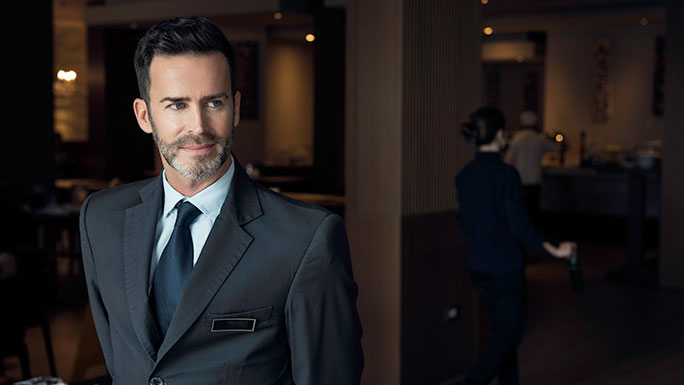The hospitality industry is a field that relies heavily on communication.
Whether you’re working in a hotel, restaurant, or another service industry job, strong communication skills are essential.
We’ll discuss the importance of communication in the hospitality industry, how you’ll benefit from having great communication skills as a hospitality professional, and how to develop your broader hospitality skill set.
The role of communication in the hospitality industry

Communication is a critical component of the hospitality industry.
Whether it’s communicating with guests to ensure their satisfaction or coordinating with staff to provide top-notch service, effective communication is essential to the success of any hospitality business.
Excellent communication skills are especially important in the hospitality industry because they can help to build rapport with guests, resolve conflicts, and create a positive overall guest experience.
Clear and concise communication helps to avoid misunderstandings and miscommunications that can disrupt the flow of operations.
What is the importance of communication skills in tourism?
Strong hospitality communication skills are essential in any customer-facing role, but they are especially important in the tourism industry.
After all, the success of a business in this sector often depends on its ability to provide excellent customer service.
Hospitality workers need to be able to effectively communicate with guests from all over the world, understand their needs, and provide them with the information and assistance they require.
As visitors are most likely unfamiliar with the area they are visiting, it is also important for tourism professionals to be able to provide clear and concise directions.
What are the benefits of effective communication skills in the hospitality industry?
If you’re looking to enter the hospitality industry or advance your hospitality career, honing your communication skills is a great place to start.
Here are a few benefits of being an effective communicator in the hospitality industry.
For example, you will…
- Stand out as a candidate for your dream hospitality job.
- Be capable of building strong relationships with guests and earning their repeat business.
- Be better equipped to deal with difficult situations and guest complaints.
- Possess a better understanding of your staff’s needs and be able to more effectively manage them.
- Be able to create a positive work environment and build morale among your team.
- Be better at promoting your establishment and attracting more business.
All of these can make you stand out as a hospitality professional and help you succeed in this competitive industry.
So if you’re looking to give yourself a leg up, start working on your communication skills today.
Kickstart your hospitality industry career today with a hospitality degree program.
With Les Roches, you’ll get a 5-star rated higher education program committed to giving you small classes and training in luxury resorts for the best learning experience possible.
You’ll be able to take your communication skills to the next level and thrive in the hospitality industry.
Employers are looking for young communicative talents
With the rise of globalization and technology, businesses need employees who are able to effectively communicate with customers and clients from all over the world.
This requires more than just a good command of your first language.
Digital communication skills are increasingly important, alongside traditional language skills.
Non-verbal communication is as important in the hospitality industry, from understanding body language, and being able to communicate with people who don’t speak the same language as you.
Part of being a good communicator is using empathy and understanding when you notice a guest who is struggling to communicate.
If you work in a large hotel, for example, it is likely that you will encounter guests from a variety of backgrounds.
While verbal communication in the hospitality industry goes a long way, a good communicator will have cultural sensitivity and be able to facilitate non-verbal guests.
These are skills that can be developed through education and training.
Demonstrating that you have strong communication skills can help you stand out from the crowd and give you a competitive edge in the job market.
The modern workplace is increasingly reliant on technology, but that doesn’t mean that face-to-face communication skills are no longer important.
In fact, they are more important than ever in this industry.
The importance of effective communication of a hotel manager

The ability to communicate clearly and concisely with staff, guests, and other industry professionals is crucial to the success of any hospitality business.
A hotel manager who can effectively communicate their vision and expectations to their team is more likely to achieve results than one who cannot.
What is two-way communication in the hospitality industry?
It is not enough to simply tell your staff what you want them to do, you must also take the time to listen to their feedback and concerns.
Only by understanding the needs and wants of both your team and your guests, can you hope to create an environment that is truly welcoming and accommodating.
When it comes to communication, remember that the old adage still holds true: it is not what you say, but how you say it.
The tone and delivery of your message are just as important as the words themselves.
A well-spoken hotel manager who is able to project confidence and leadership will be successful.
The hospitality industry is a fast-paced and ever-changing field, which means that interpersonal skills are essential for any hotel manager to succeed.
By taking the time to hone your leadership skills, you’ll ensure that your hotel runs smoothly and efficiently while providing guests with the best possible experience.
What are the skills needed for hospitality management?
The skills needed for hospitality management vary, depending on the type of establishment. However, some essential skills that all hospitality managers should possess include:
- Excellent communication abilities. Hospitality managers should be able to effectively communicate with guests, staff, and other stakeholders. This includes being able to give clear instructions, provide updates and information, and resolve any conflicts that may arise.
- Good people skills. In the hospitality industry, customer service is paramount. Hospitality managers should be friendly and personable in order to create a positive experience for guests. They should also be able to lead and motivate staff to provide excellent service.
- Strong organizational skills. Hospitality managers need to be able to organize their team’s time and their own efficiently. By prioritizing and delegating tasks efficiently, they can keep operations running smoothly.
- Multi-tasking abilities. As a hospitality manager, you will often have to juggle multiple tasks at once. This includes everything from managing staff to dealing with guests’ requests. Being able to multi-task is essential in order to be successful in this role.
- Problem-solving skills. No matter how well you plan, there will always be unexpected challenges that arise in the hospitality industry. Hospitality managers need to think on their feet and come up with solutions to problems quickly and efficiently.
If you are interested in learning more about hospitality management, there are a number of courses available that can help you improve your skills at Les Roches.
These courses cover everything from customer service skills to verbal communication skills and can be chosen to meet your specific needs.
Whether you’re just starting out in the hospitality industry or looking to take your career to the next level, investing in a hospitality management course is a great way to improve your skills and knowledge, while giving you a competitive advantage in this exciting field.
Serious about your hospitality career?
Insights on the latest industry trends, career development advice, and program releases from one of the world’s leading hospitality schools.
We respect your privacy. Unsubscribe at any time.
Why is communication important in the hotel management industry?

Keeping guests happy is one of the key objectives of hotel management.
This comes into every aspect of the customer journey: clear advertising and a straightforward booking system, frictionless check-in and check-out experience, friendly reception with clear directions, and regular support throughout the guests’ stay, should they need your help.
Here are some tips for developing the set of skills needed for hospitality and tourism management:
- Practice active listening. Active listening is a skill that involves not only hearing what the other person is saying, but also trying to understand their point of view. This can be helpful in resolving conflicts and ensuring that everyone is on the same page.
- Be clear and concise in your communication. When giving instructions or conveying information, do it in a way that is easy to understand. This means avoiding jargon and using simple language.
- Keep an open mind. It’s important to be open to new ideas and suggestions from your team. By being receptive to feedback, you can create a more effective and efficient hotel operation. Good communication is a two-way process.
- Be respectful. In any communication, it’s important to maintain a respectful tone. This will help to create a positive work environment and foster good relationships with your team.
- Be patient. There will always be misunderstandings and miscommunications in any workplace. The key is to not get frustrated and to patiently work through the issue with the other person until it is resolved.
Ready to take the next step in your hospitality career?

These are only a few tips for improving communication in the hospitality sector.
Understanding and mastering communication is essential for anyone looking to enter the hospitality management field.
The best way to refine your communication skills and show employers that you are dedicated to the industry is to get educated and develop your critical thinking skills to deliver an incredible guest experience.
Complete your hospitality management degree online from an accredited institution, such as Les Roches, and start your journey today.
With the right education, you can develop the teamwork skills needed to succeed in any hospitality management role.
Get started with a hospitality management bachelor degree to give you a great foundation in the industry, and follow up with an MBA in hospitality management to take your career to the next level.




